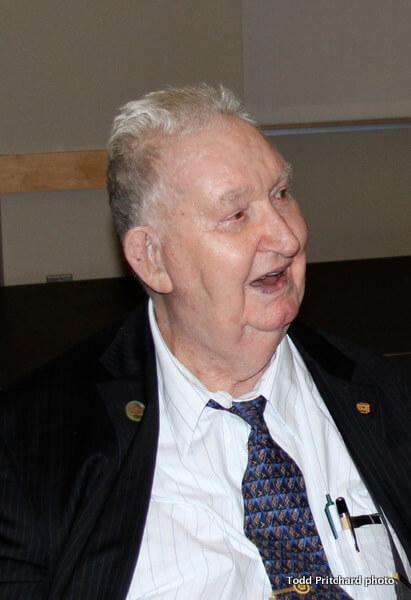The era of the Extension county agent from the 1950s through early 1980s is now the stuff of nostalgia nationwide. The days are gone when these advisors made weekly farm visits, wrote newspaper columns, broadcast radio shows, were fixtures at local fairs and agricultural events. But the men themselves, now retired along with their positions, are witnesses to radical changes in agriculture during their lifetimes. For example, in just 30 years, hay went from loosely harvested to bailed, milking machines replaced farm hands, bulk tanks made milk cans into decorator items. The landscape changed literally in countless ways.
John C. Page of Bennington is emblematic of the era.
This is one reason Page was a recipient on May 14, of the University of Vermont College of Agriculture and Life Sciences Robert O. Sinclair Cup for commitment to the land-grant mission to serve Vermonters. He is the ninth recipient of the award since it was endowed, in 2006, by its namesake, a former dean of the College. Other retired Vermont Extension agents who have received the award are Leonard Mercia, Lawrence Myott and Lucien Paquette. The presentation was part of CALS 18th annual alumni and friends dinner hosted by the College’s Dean Tom Vogelmann.
Page was born in Johnson and by age 16, enrolled in Vermont Technical College. Upon graduation, two years later, he worked on an estate farm before joining the army. He served in World War II. Back at home, he attended UVM from 1946-1950, graduating with a bachelor’s degree in agronomy. He moved to Bennington in 1951. A year later, he took a job with UVM Extension as its county agent and stayed for 34 years.
“John Page’s 34 years as a county agricultural agent was unrivaled in scope and depth. His area of expertise was agronomy, but he knew as much about human behavior as he did about birdsfoot trefoil, the forage crop,” said UVM Extension Associate Dean Gary Deziel in presenting the award.
Deziel took the liberty of perpetuating a little oral history as he told this tale: When Page took over as county agricultural agent in Bennington in 1952, his predecessor, Harry Mitiguy, sat him down and gave him some advice: Mitiguy said that teaching farmers new things wouldn’t be a problem.
“Your problem,” he said, “is going to be to get farmers to change habits that are wrong and that are hurting them.”
Page became notorious for his unorthodox methods, like the time he confiscated a farmer’s milking machine after telling him repeatedly that too much milking was causing the cows mastitis, recounted Deziel.
“But in those days, Page could get away with things like that because the farmer knew John and knew that his methods were for the farmer’s own good,” Deziel said.
His nominator for the Sinclair Cup, Extension Associate Professor Dianne Lamb pointed out, “many farmers today attribute their good fortune and good business sense to John’s fiery temper and persistence.”
Like most county agents, Page wrote a newspaper column and broadcast a radio show. His 12-minute radio spots aired every Monday and Tuesday for 30 years. He talked agronomy, farm management, bees, gardening, weather and related topics. Listeners still remember his signature phrase, “don’t forget to drink your milk today.”
And long before the Master Gardener program, Page taught a four-session gardening course, three nights a week for four weeks from February into April, reaching over 2,000 folks in southern Vermont during its 14-year run.
The local feed store owner, Arthur Whitman remarked, “It was very apparent that John’s primary goal was to make sure farming was in the future of Bennington County for many generations.”
Deziel added “John’s extraordinary and colorful career brought honor and distinction to UVM Extension and enriched the lives of everyone he worked with.”
UVM Extension Associate Professor Rick LeVitre said it best in his letter of recommendation of Page for the Sinclair Cup. “He knew every farmer, was welcome at their kitchen tables, helped them with their taxes, pushed them to do better, helped their kids get in to college, was an active community member. John loved his work, loved the farmers, and was rewarded by simply doing his work.”
